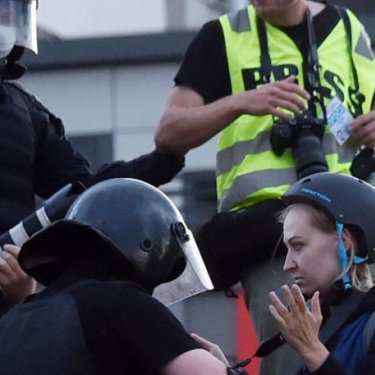RSF calls for EU sanctions in response to crackdown on press in Belarus

Reporters Without Borders (RSF) is appalled by the unprecedented scale of the crackdown on journalists in Belarus in connection with its presidential election on 9 August and calls on the European Union to condemn the repression and sanction those responsible.
The unparalleled and relentless persecution has taken many forms including arbitrary arrest, prolonged detention, beatings and deportation. According to the Belarusian Association of Journalists (BAJ), more than 130 serious violations of journalists’ rights were registered from 8 May, the start of the election campaign, to 11 August, 48 hours after the election.
“Such persecution of the media in Europe is completely unacceptable,” RSF deputy editor-in-chief Catherine Monnet said. “As EU foreign ministers prepare to hold an extraordinary meeting today, we request an emphatic condemnation of these flagrant violations of the right to inform. And, in the absence of an immediate end to the harassment of the media and the release of the journalists still held, we urge EU members to adopt sanctions against those responsible for the violence and unjustified arrests.”
Massive and arbitrary arrests
According to the BAJ, around 70 journalists have been arrested in Belarus since 9 August, while covering the election and the protests that followed the announcement of the results, and 23 were still being held in different parts of the country yesterday. They include Vitaly Dubik and Alena Shcharbinskaya, two journalists with Belsat, a Belarusian exile TV channel based in Poland, who were arrested in Minsk on 10 August.
Most of the arrests have been carried out under article 23.34 of the Belarusian Administrative Code, which penalizes “violation of the regulation of mass actions.” Dmitry Kazakevich, a Belsat journalist arrested in Vitebsk on the evening of 9 August, has been given 10 days of preventive detention under this article.
Some journalists, such as Yegor Martinovich, the editor of Nasha Niva, one of the oldest independent Belarusian weeklies, were unable to report that they were being arrested and disappeared for several days without being able to contact colleagues or loved-ones until they were released.
Excessive violence against Belarusian and foreign reporters
Violence has sometimes been used. In all, 29 cases of police violence against journalists have been reported since election day. At least seven journalists have been badly injured by the police, including Nasha Niva’s Natalia Lubnevskaya, who was hospitalized after being hit in the leg by a rubber bullet, and Associated Press photographer Mstyslav Chernov, who was hospitalized after being badly beaten by the police.
Maxim Solopov, a Russian reporter sent to Belarus by the Riga-based news website Meduza, was covering the protests in Minsk on the evening of 9 August when he was badly beaten by police and then arrested. Anton Starkov and Dmitri Lasenko, Russian reporters for the Moscow-based Daily Storm website, were clubbed by police when they were briefly arrested on 9 August.
Although the few remaining independent Belarusian media outlets were undeniably among the victims of the crackdown, foreign journalists have not been spared, especially Russian, Polish and Ukrainian journalists. Several were deported on the official grounds that they lacked accreditation from the Belarusian foreign ministry, which issued very few accreditations to foreign reporters.
Not that accreditation has guaranteed protection. When plainclothes police apprehended three BBC journalists with valid accreditation on 11 August in Minsk, they damaged their cameras, hit one of them and snatched the accreditation from another member of the crew.
At least five governmental TV channel presenters, including Belarus-1 presenter Vladimir Burko, have resigned in the past two days in solidarity with the protesters and to condemn the police violence. According to the Office of the UN High Commissioner for Human Rights, around 6,000 people have been arrested since 9 August. Two people have died and hundreds have been wounded in the course of the police crackdown.
The Internet has meanwhile been totally or partially inaccessible in Belarus since 9 August, and most news websites continue to be blocked.
Ruled since 1994 by President Alexander Lukashenko, who has been reelected in the first round every five years, Belarus is ranked 153rd out of 180 countries in RSF’s 2020 World Press Freedom Index.



